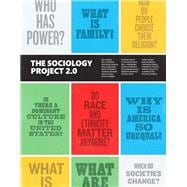Inspire each student’s sociological imagination.
Authored collaboratively by members of the NYU Sociology Department, The Sociology Project 2.0 draws on the collective wisdom of expert faculty to reveal how individuals are shaped by the contexts in which they live and act. Organized around the big questions in every subfield of the discipline, The Sociology Project 2.0 shows how sociologists analyze our world and sets students off on their own journeys of sociological inquiry. At its core, The Sociology Project 2.0 seeks to inspire each student’s sociological imagination and instill in each reader a new determination to question the world around us.
The Sociology Project 2.0 is available via REVEL™. Fully digital and highly engaging, REVEL offers an immersive learning experience designed for the way today's students read, think, and learn. Enlivening course content with media interactives and assessments, REVEL empowers educators to increase engagement with the course, and to better connect with students.
Available exclusively in REVEL for The Sociology Project 2.0, videos integrated throughout the narrative depict the author of each chapter talking through key content, inspiring and engaging students. And Social Explorer interactives allow students to apply the concept that was just explained using specific data from their own city, county, or state, which boosts the relevance and relatability of course material.
NOTE: You are purchasing a standalone product; REVEL does not come packaged with this print textbook. If you would like to purchase access to the REVEL version of this text, please search for ISBN-10: 0133884317 or ISBN-13: 978-0133884319.
REVEL should only be purchased when required by an instructor.
REVEL should only be purchased when required by an instructor.








